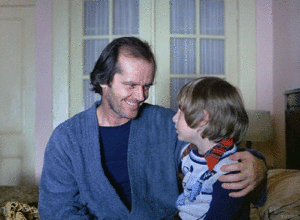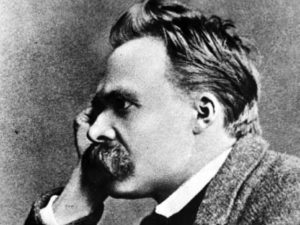1
When love is over and a prison-world begins
This is a summary of a series of articles that have sparked moral outrage on social media. The indignation, of course, did not come to me as a surprise at all. Simply because it is considered as crass to bring into question the alleged happiness with children. If one does, one runs the risk of being characterized as a sickish misanthropist. Knowing that such kind of social side effects are inevitable I’ll start this article with a seemingly innocent question. How does one live as a young couple a happy, meaningful, future-oriented life?
According to normal, everyday people the answer to this question is, to a large extend, raising children. There’s a widespread opinion claiming that unforgettable,

joyous experiences are guaranteed when watching a child grow. The same opinion insists upon that the time spent providing unlimited love and care offers as a reward priceless enrichment for ones soul. This opinion is so entrenched in society, that especially women feel the “need” of having children in order to experience by themselves the happiness with children.
There’s, as we know, always a big gap between common opinions and reality Many people, however, prefer nevertheless be rather kissed by pretty lies than slapped by the truth. For young couples this strategy works very well as long they don’t have a baby at home. But from the moment on they do, most couples can’t avoid being mercilessly exposed to this slap. Instead of enjoying the eagerly anticipated happiness with their child, they realize being in the beginning of a never ending unhappiness. This is even confirmed by some recent psychological studies indicating clearly, that compared to divorce, spousal dead, or unemployment, having a baby entails the highest possible rate of unhappiness.
Here is not the place to discuss such findings. More important is the question why peoples everyday life with a baby goes on in an overall atmosphere of strong disillusionment and growing embitterment? Since a river is always changing, and, consequently, never can be the same river, it is not possible, as Heraclitus correctly pointed out, to step in the same river twice. I refer to this metaphor because a baby is changing a couples “river of life”. Not only do they find themselves in murky,

unknown waters but also more and more on riverbanks opposed to each other. Plainly said, it might be possible to squeeze cold beer out of a burning hot rock in the Sahara, but it’s absolutely impossible being parents and remaining lovers simultaneously.
Lovers tend to overlook from the very beginning the sobering fact that their amorous love is nothing but natures method to safeguard the continuity of mankind. When nature has achieved its goal, logically, every romantic love must become necessarily redundant. Significantly, it is a common experience among couples that even the biggest love disappears through the backdoor when a baby screams continuously for attention. I don’t think it is exaggerated to claim that everyday life for most couples with babies is changing from a rose garden into a prison-world. Let’s spare ourselves the trouble to reveal the hardships of this world in detail.
2
Parent-child relationships and the “vale of tears”
One could, of course, remind me here that the situation is improving when children become somewhat older. Unfortunately, this is wishful thinking. The unhappiness with children doesn’t end here. On the contrary, parents and children can’t avoid to

find themselves in a never ending “vale of tears”. I don’t want to make you depressed, but parent-child relationships are since the times of the ancient Greeks and Romans nothing but a terrible disaster area. Every quick glance at Western literature is more than enough to show us that parent-child relationships are the biggest catastrophe of mankind, which has kept piling up human wreckage on human wreckage throughout the course of history.
There is, for example, a baby left to die in the mountains by his father. More famous than Oedipus is a fatherless grown up lad who compensates successfully his real existing fatherlessness with the bizarre idea of a heavenly father. Generations of scholars have not paid attention to the fact that Christianity, the spiritual pillar of Western culture and society, is erected on an unfortunate, highly problematic parent-child relationship. Besides, abysmal dimensions of dysfunctional family structures can be found in Shakespeare’s plays, modern literature, the cinema, and, last not least, on a daily basis in the news.
One should not forget here that many parents are “bad company” for their kids. Parents might be “good” people, but what about parental competence? No one finds employment nowadays without relevant competence. Everyone, on the other hand, is entitled to raise children.
Children want a lot of things, but what they really need is orientation and guidance; upbringing. Therefore, simplified said, parents have to act as secular missionaries to the strangest people: their own children. Needless to say that disoriented parents with no idea what upbringing implies send their children inevitably straightaway into the desert. Instead of competent upbringing many times a sweetish culture of friendship with a “trust me” and “everything will be okay” attitude is offered. But

children don’t want their fathers and mothers as moderating friends! With friends like that, who needs enemies? It should not come as a surprise when disoriented kids of disoriented, incompetent parents fall victim for false prophets: populists, promising orientation and competence.
3
Procreation; an ll-fated copy process
Taken as a whole, procreation, or reproduction, or however one prefers to label it entails enormously terrifying aspects. How come mankind is living on a most

probably very soon inhabitable becoming planet like on a sinking ship? How come man is discussing the magnitude of self-inflicted problems but not capable solving them?
Dear reader, has it ever crossed your mind that we since ancient times only had a few real geniuses such as Plato, Aristotle, Leonardo, Shakespeare, Beethoven, or Picasso? We have a lot of stuff for our convenience: cars, houses, smartphones, credit-cards etc. We have, on the other hand, not developed as human beings at all. Let’s face it, we are a dull, dazed, and confused, in one word, stupid specie. No one will miss us when we don’t exist anymore. How come we have not managed to create an at least somewhat decent living for all of us? The answer to this has nothing to do with politics or economy but procreation.
As my word limit starts to run out I would very much like to end this article by

referring to a philosopher who has put his finger on our weakest spot when it comes to procreation. In a good Socratic manner Friedrich Nietzsche is asking us why we want to have children.
You are young and wish for a child and marriage. But I ask you: are you a man entitled to wish for a child? Are you…the commander of your senses, the master of your virtues…? Or is it the animal, and need that speak out of your wish? Or loneliness? Or lack of peace with yourself?
I don’t think it is difficult to agree upon that most people simply don’t know exactly why they want children. It is just something one must have, they might say, since everyone else has kids as well. Personally, I’m more and more convinced that people

want children as a living decoration for their lifestyle. I once knew a father of two young kids who had as his hobby to restore old army jeeps. With his wife next to him and the kids on the backseat he loved to park his eye catching vehicles in front of restaurants and coffee shops. This laughable show came to an end when the kids grew older. The couple is divorced since then and the kids in a lamentable situation.
It is not very likely that this couple was reading Nietzsche. However, reading the chapter on “Child and Marriage” in “Thus spoke Zarathustra” (2) could have been a moral eye opener:
You shall not reproduce yourself, but produce something higher…Marriage: thus I name the will of the two to create one that is more than those who created it.
What is Nietzsche talking about here? Please don’t get me wrong, it is not my intention to recommend him as an external adviser for the bedroom. What Nietzsche points out, however, is the undeniable fact that bedroom activities are triggering an ill-fated copy process. A procedure, where children from one generation to the next become questionable copies of questionable originals. The old proverb: “an apple falls never far away from the tree” illustrates this dilemma. As long there is no vertical procreation, as Nietzsche propagates it, unhappiness and disaster must inevitably remain the dominant feature in parent-child relationships.